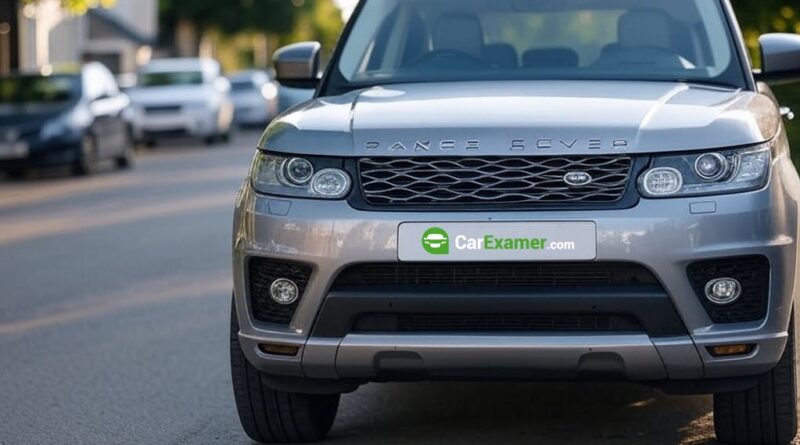Range Rover Sport Problems: What To Know Before Buying
The Range Rover Sport is one of those cars that just feels special — powerful, comfortable, and built to turn heads. But let’s be honest: while it’s got serious presence, it’s also known for being a bit… temperamental. Most unreliable car brand in the UK and around the world. If you’re thinking of buying a used one, or you already own one and want to know what could go wrong, here’s a rundown of the most common Range Rover Sport problems, and what to keep an eye on.
1. Air Suspension Woes
One of the standout features of the Range Rover Sport is its air suspension — it gives a smooth ride and adjusts to different heights. But it’s also one of the first things that tends to go wrong.
🚨 Common signs:
- The car looks like it’s sitting lower than usual
- It leans to one side
- A “suspension fault” warning pops up on the dash
Repairs can get pricey, especially if you need a new compressor or air struts, so check this system thoroughly before buying.
2. Electrical Quirks
Range Rovers, especially older ones, are known for having random electrical issues.
💡 Expect things like:
- The infotainment system freezing or going blank
- Warning lights that come and go
- Tailgate refusing to open or close properly
- Central locking acting up
They’re not always serious, but they’re definitely frustrating — and can lead to expensive diagnostics.
3. Turbo Problems (Especially on Diesel Models)
If you’re looking at a diesel Range Rover Sport — particularly the 2.7 TDV6 or 3.6 TDV8 — make sure the turbochargers are healthy.
🛠️ Red flags:
- A loud whining or “siren” noise from the engine
- A big drop in power
- Clouds of smoke from the exhaust
Turbo failure is a common and expensive issue, and in some models, you actually have to lift the body off the chassis to replace them. Seriously.
4. Oil Leaks
It’s not unusual to find a Range Rover with a few oil spots under it. But it’s still worth checking how bad it is.
🛢️ Leaks usually come from:
- The oil filter housing
- Rocker cover gaskets
- Oil cooler
Small leaks might be manageable, but if it’s leaking badly, it could lead to bigger engine problems later.
5. Transmission Issues
Some older Range Rover Sports (especially those with the 6-speed gearbox) are known for transmission problems.
⚙️ Warning signs:
- Jerky gear changes
- Delayed shifting
- “Transmission Fault” messages
In some cases, a fluid change helps. In others, you might be looking at a full gearbox rebuild — not cheap.
6. Timing Chain and Turbo Drain Pipe Issues (3.0 SDV6)
If you’re considering a 3.0 SDV6 diesel, be aware that timing chains can stretch and the turbo oil drain pipes can clog. Both can lead to turbo or engine failure.
Best advice? Only go for one that’s had full service history and frequent oil changes with the right spec oil.
7. EGR Valve and DPF Blockages
Like a lot of modern diesels, the Range Rover Sport can have EGR valve or DPF (Diesel Particulate Filter) issues — especially if it’s been used mostly for short trips.
⚠️ You might notice:
- A drop in power
- Dashboard warning lights
- Poor fuel economy
DPF problems can cost thousands to fix if ignored.
8. Parking Brake Issues
Another common niggle is the electronic handbrake. It’s not unusual for it to seize up or fail entirely, especially on older models.
Signs:
- Grinding noise when applying/releasing the brake
- Dash error messages
- The brake not holding or releasing properly
Are They Reliable?
Well… they can be — but only if looked after properly. A Range Rover Sport isn’t a cheap car to run, and skipping maintenance usually leads to big repair bills. That said, newer models are more reliable, and even older ones can be great if you buy carefully.
✅ Look for full service history
✅ Get a pre-purchase inspection
✅ Be ready for above-average repair costs
Final Thoughts
The Range Rover Sport is a seriously impressive SUV — but it’s not the kind of car you buy and forget about. It needs regular care, and some parts (like air suspension or turbos) can bite you in the wallet if they go wrong.
If you’re considering one, do your homework, get it checked out properly, and make sure you’re budgeting for upkeep. Do that, and you’ll have a vehicle that’s as enjoyable to own as it is to drive.
Buying a used VW. Buying used vauxhall, BMW, Jaguar, Ford, Volvo, Range rover, Bentley, Aston Martin, Porsche, Ferrari, Lamborghini, Maserati, Hyundai, Tesla, Honda, Pagani

